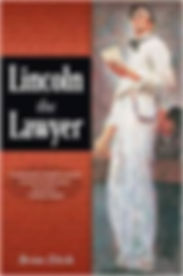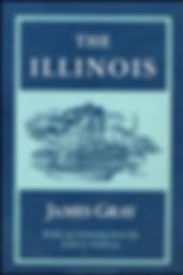Corn Kings and One-Horse Thieves
Odds & ends

Illinois past and present, as seen by James Krohe Jr.
The Corn Latitudes
Giving Immortality to
Their Littleness
Gov. Thomas Ford’s diagnosis of Illinois politics
Illinois Times
March 4, 2010
Gov. Thomas Ford, who served from 1842 to 1846 ) saved Illinois’ s future. He did so by extricating it from the fiscal folly of the General Assembly, which had recklessly pledged future revenues the state couldn’t deliver (in their case, bond payments for a ludicrous infrastructure expansion). He later wrote a pungent history of the state that was largely devoted to that effort. Would that every governor's memoirs were as good.
By all means seek out the 1995 U of I Press edition.
Reviewed: A History of Illinois, from Its Commencement as a State in 1818 to 1847, etc. by Thomas Ford, introduction by Rodney O. Davis. University of Illinois Press, 1995.
Illinois has a very short list of distinguished governors and a somewhat longer one of able historians. The list of distinguished governors who also are able historians is very short indeed. Only one name is on it, that of Thomas Ford.
Ford’s term in Springfield, from 1842 to 1848, was his first and only in popularly elective office. He came into office faced with two armed insurrections—in western Illinois, where Mormons and locals were at each other’s throats like Sunni and Shia in Iraq, and in southern Illinois, which was plagued by posses of banditi. The state was convulsed by anti-abolition mob violence, and he had to shepherd through a fractious General Assembly a plan to ease a fiscal crisis that makes today’s budget shortfalls look like lost lunch money.
The man who saved Illinois from bankruptcy was unable to save himself. Ford practiced law in Peoria after he left office—former governors did not automatically receive pensions in those days—but failed to make a living. Dying of tuberculosis and needing money to support his children, Ford did what only desperate people do and sat down to make money writing, in his case a popular history of Illinois.
Freed from political ambition by his health and his poor public standing, he felt no need to kowtow to “balance” and “fairness.” Like Blagojevich’s The Governor, Ford’s History has been damned as self-serving, and so it is, the way a thug’s blackjack may be said to be self-serving. Illinois government was bad, Ford argued, because its politicians were a little too representative of its people, being as greedy as pigs at the trough and more ignorant. “Though respectable in other matters,” Ford wrote in a typical aside the four legislators who opposed his plan to clean up the state banks, “to my certain knowledge [none] was capable of entertaining two ideas about public affairs at the same time [or] of tracing the connection between them.”
Historian Thomas Macaulay once observed that no man is fit to govern great societies who hesitates about disobliging the few who have access to him for the sake of the many whom he will never see. Ford was disobliging to a great many insiders; when a contemporary later wrote that Ford was wanting in tact, it was like calling Pat Quinn wanting in charisma. His friend and former colleague James Shields, in his introduction to the original edition, felt compelled to state, “I regret the severity of some of the author’s judgments, and the censure with which he assails the character of some of our public men, who are both my personal and political friends.”
His portraits of Illinois’s public types are all too recognizable today. About one circuit court judge he wrote: “As a judge he knew just enough of law and had practiced enough in its quibbles to obliterate from his heart the instinct in favor of natural justice. without supplying its place by the lights of science.” What he wrote about the Mormons of Nauvoo could be written about any group that defines politics in terms of the victimized and saviors. “All action of the government which bore hard on them, however legal, they looked upon as wantonly oppressive; and when the law was administered in their favor they attributed it to partiality and kindness” on the part of the administering officer.
Ford himself anticipated the charge that he was merely settling scores, and claimed a higher purpose for his book. History usually deals with events and results, he explained, but “the characters and motives of those who were the most active in bringing them about . . . . is the hidden soul and most instructive part of history,” and he would unhide them. “It is believed that many public men in Illinois . . . were encouraged, by their insignificance, to hope for oblivion; and it is, perhaps, after all, not very fair to take them by surprise, by recording their miserable conduct, giving a small immortality to their littleness.”
The events of Ford’s Illinois make for a ripping yarn, but readers without a special interest in Illinois history may find much of it as incomprehensible as an account of the religious politics of Britain’s Stuart kings. Nor is it a comprehensive treatment; as Knox College scholar Rodney Davis has noted, nearly half the book deals with Ford’s administration as governor and all of it with Illinois history during his own lifetime. In any event his narrative stops in 1846, a generation before modern Illinois began to emerge. (If he wrote “about small events and little men,” he explained, it was because “there was nothing else in the history of Illinois to write about.”) Nonetheless it remains, after a century and a half, as contemporary a work on Illinois politics as there is on the shelf. ●
SITES
OF
INTEREST
Essential for anyone interested in Illinois history and literature. Hallwas deservedly won the 2018 Lifetime Achievement Award from the Illinois State Historical Society.
One of Illinois’s best, and least-known, writers of his generation. Take note in particular of The Distancers and Road to Nowhere.
See Home Page/Learn/
Resources for a marvelous building database, architecture dictionary, even a city planning graphic novel. Handsome, useful—every Illinois culture website should be so good.
The online version of The Encyclopedia of Chicago. Crammed with thousands of topic entries, biographical sketches, maps and images, it is a reference work unmatched in Illinois.
The Illinois chapter of the American Institute of Architects in 2018 selected 200 Great Places in Illinois that illustrate our shared architectural culture across the entire period of human settlement in Illinois.
A nationally accredited, award-winning project of the McLean County Historical Society whose holdings include more than 20,000 objects, more than 15,000 books on local history and genealogy, and boxes and boxes of historical papers and images.
Mr. Lincoln, Route 66, and Other Highlights of Lincoln, Illinois
Every Illinois town ought to have a chronicler like D. Leigh Henson, Ph.D. Not only Lincoln and the Mother road—the author’s curiosity ranges from cattle baron John Dean Gillett to novelist William Maxwell. An Illinois State Historical Society "Best Web Site of the Year."
Created in 2000, the IDA is a repository for the digital collections of the Illinois State Library and other Illinois libraries and cultural institutions. The holdings include photographs, slides, and glass negatives, oral histories, newspapers, maps, and documents from manuscripts and letters to postcards, posters, and videos.
The people's museum is a treasure house of science and the arts. A research institution of national reputation, the museum maintains four facilities across the state. Their collections in anthropology, fine and decorative arts, botany, zoology, geology, and history are described here. A few museum publications can be obtained here.
“Chronicling Illinois” showcases some of the collections—mostly some 6,000 photographs—from the Illinois history holdings of the Abraham Lincoln Presidential Library.
I will leave it to the authors of this interesting site to describe it. "Chicagology is a study of Chicago history with a focus on the period prior to the Second World War. The purpose of the site is to document common and not so common stories about the City of Chicago as they are discovered."
Illinois Labor History Society
The Illinois Labor History Society seeks to encourage the preservation and study of labor history materials of the Illinois region, and to arouse public interest in the profound significance of the past to the present. Offers books reviews, podcasts, research guides, and the like.
Illinois Migration History 1850-2017
The University of Washington’s America’s Great Migrations Project has compiled migration histories (mostly from the published and unpublished work by UW Professor of History James Gregory) for several states, including Illinois. The site also includes maps and charts and essays about the Great Migration of African Americans to the north, in which Illinois figured importantly.
An interesting resource about the history of one of Illinois’s more interesting places, the Fox Valley of Kendall County. History on the Fox is the work of Roger Matile, an amateur historian of the best sort. Matile’s site is a couple of cuts above the typical buff’s blog. (An entry on the French attempt to cash in on the trade in bison pelts runs more than
2,000 words.)
BOOKS
OF INTEREST

Southern Illinois University Press 2017
A work of solid history, entertainingly told.
Michael Burlingame,
author of Abraham
Lincoln: A Life
One of the ten best books on Illinois history I have read in a decade.
Superior Achievement Award citation, ISHS Awards, 2018
A lively and engaging study . . . an enthralling narrative.
James Edstrom
The Annals of Iowa
A book that merits the attention of all Illinois historians
as well as local historians generally.
John Hoffman
Journal of Illinois HIstory
A model for the kind of detailed and honest history other states and regions could use.
Harold Henderson
Midwestern Microhistory
A fine example of a resurgence of Midwest historical scholarship.
Greg Hall
Journal of the Illinois
State Historical Society
Click here
to buy the book
Southern Illinois University Press
SIU Press is one of the four major university publishing houses in Illinois. Its catalog offers much of local interest, including biographies of Illinois political figures, the history (human and natural) and folklore of southern Illinois, the Civil War and Lincoln, and quality reprints in the Shawnee Classics series.
The U of I Press was founded in 1918. A search of the online catalog (Books/Browse by subject/Illinois) will reveal more than 150 Illinois titles, books on history mostly but also butteflies, nature , painting, poetry and fiction, and more. Of particular note are its Prairie State Books, quality new paperback editions of worthy titles about all parts of Illinois, augmented with scholarly introductions.
The U of C publishing operation is the oldest (1891) and largest university press in Illinois. Its reach is international, but it has not neglected its own neighborhood. Any good Illinois library will include dozens of titles about Chicago and Illinois from Fort Dearborn to
Vivian Maier.
Northern Illinois University Press
The newest (1965) and the smallest of the university presses with an interest in Illinois, Northern Illinois University Press gave us important titles such as the standard one-volume history of the state (Biles' Illinois:
A History of the Land and Its People) and contributions to the history of Chicago, Illinois transportation, and the Civil War. Now an imprint of Cornell University Press.




Reviews and significant mentions by James Krohe Jr. of more than 50 Illinois books, arranged in alphabetical order
by book title.
Run by the Illinois State Library, The Center promotes reading, writing and author programs meant to honor the state's rich literary heritage. An affiliate of the Library of Congress’s Center for the Book, the site offers award competitions, a directory of Illinois authors, literary landmarks, and reading programs.
